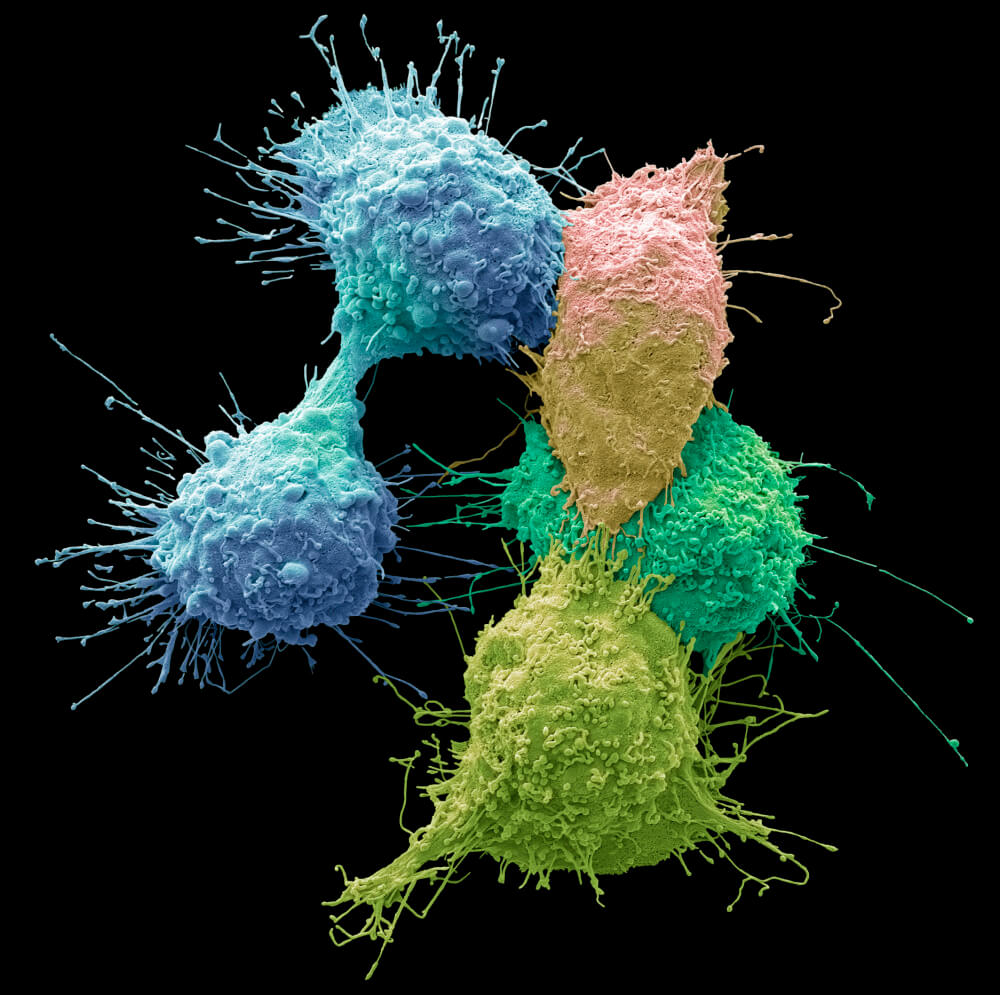Every cancer starts with a mistake deep inside the nucleus of a single cell, where DNA is stored.
Abnormalities in DNA can be inherited from one’s parents or can occur because of exposure to harmful substances in the environment such as chemicals in tobacco, ultraviolet radiation from the sun, and perhaps, chemicals in our diet. Irregularities can also arise from errors that occur as cells divide.
Not every irregularity in DNA results in cancer. However, if the irregularity occurs in a gene involved in cell division — one that initiates cell division or brings it to a halt — it can set the stage for cancer. Errors in genes that are needed to repair damaged DNA can play a role as well.
When such errors occur within a cell, they’re passed on to each of its descendants. Eventually, hundreds, thousands, or millions of cells may carry these abnormalities.

Compounding errors
A single genetic change, or mutation, is usually not enough to turn a cell cancerous. Cells have a variety of mechanisms for correcting or bypassing malfunctioning genes. But when enough of these changes occur that the process of cell division begins to veer out of control, a cell is considered cancerous.
Cancer cells that originate in solid tissues or organs may multiply to produce a mass, or a tumor. These can interfere with the function of the organ or tissue or press against it in potentially harmful ways. Cancer cells that arise in the bone marrow, where blood and lymph cells form, can lead to blood-related malignancies such as leukemia, lymphoma, multiple myeloma, and myelodysplastic syndromes.
One common feature of cancer cells is their immaturity. Errors in their DNA can prevent them from developing fully. As a result, they don’t carry out the functions of the normal cells from which they originate: a lung cancer cell, for example, does not perform the vital task of exchanging oxygen and carbon dioxide, as healthy lung cells do. As tumors grow, this can impair organs’ ability to function.
Extra abilities
Mutations can endow cancer cells with capabilities most normal cells lack. This includes the ability to uproot themselves, travel through the bloodstream or lymphatic system to a distant site in the body, and begin reproducing there. Tumor cells may also gain the ability to escape notice by the immune system, invade nearby organs and tissues, connect to the body’s blood supply, use different nutrients than normal cells, and continue dividing long beyond their normal lifespan.
With advances in cancer medicine, it’s now possible to target many of these capabilities with specific forms of treatment. Chemotherapy and radiation therapy, for example, act against cells dividing abnormally. So-called “targeted” drugs disable proteins generated by mutated genes. Anti-angiogenic therapies block tumors from accessing the bloodstream. Immunotherapies strip cancer cells of the camouflage that has made them invisible to the immune system.

Very iinforma
Excellent explanation.
Excellent article. Even I understood the explanation.
Thanks for an easy to understand explanation of cancer cells migrating to other areas of the body, mutating, etc.
We appreciate your “layman terms” so that subject doesn’t seem so foreign to the reader!
My husband is a cancer survivor (2013 & 2018) & we thank Dana Farber & the Brigham for their expertise in fighting this dreaded disease.
Great simplified explanation ! Keep up the good work.
This is interesting, but it gives short shrift to occupational and environmental carcinogenic exposures. The recent Dana-Farber “Cancer and Environment” series documented many more examples of such exposures, including air pollution and chemicals at some workplaces. I was the founding Director of the Massachusetts Cancer Registry, which was established because of the childhood leukemia cluster in Woburn in the 1970s and 80s. Subsequent studies linked prenatal exposures to water contaminated with chlorinated solvents with subsequent diagnosis of leukemia in Woburn children. These and other examples could be added to the story of “How Does Cancer Start.”
Thank you for demystifying the origins of the cancer cells.